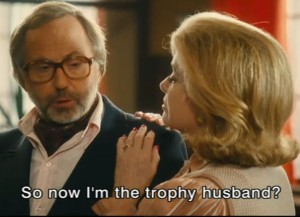Judith Godreche, director Francois Ozon, Catherine Deneuve, Fabrice Luchini and Karin Viard pose at the premiere for Potiche. Photograph: Claudio Onorati/EPA
Venice is this year becoming a festival notable for high drama and high camp, and so it proves again with this enjoyable, farcical French picture from the prolific master craftsman François Ozon, based on a 1980 stage play by Pierre Barillet and Jean-Pierre Gredy.
It’s a wacky 70s-period screwball comedy with a blue-chip cast and a tone which is arch, knowing and self-aware but also somehow affectionate and even, I suspect, deeply serious about the indomitable spirit of France itself, in the queenly person of Catherine Deneuve. It is a veritable palimpsest of irony levels; perhaps only a French audience can fully respond to its nods and winks.
The British film industry might produce an equivalent, perhaps, by hiring Michael Winterbottom to direct a post-modernised screen adaptation of a Brian Rix farce, using stylistic hints and surviving cast members from Carry On and Are You Being Served? – but even this wouldn’t be precisely the same thing.
Catherine Deneuve gives an unmistakably regal performance as Suzanne Bujol, a potiche, or trophy wife, to Robert (Fabrice Luchini) the wealthy, reactionary owner of an umbrella factory in 1977; he patronises his wife and is alienated from his grown-up children (played by Jérémie Renier and Judith Godrèche.)
When Robert is hospitalised after an ugly confrontation with striking workers, Suzanne has to take over the factory and to help her master the intricacies of labour politics, she calls upon an old friend and former lover, the communist mayor Maurice Babin, with whom she once enjoyed a passionate bout of al fresco sex. Babin is played by Gérard Dépardieu, here looking very portly, especially compared with the svelte Deneuve, who shows off her morning run and touch-toe exercises in a dinky little jogging outfit at the beginning of the movie. Perhaps Deneuve is too restrained to be a gay icon, but the little twinkle in her eye signals to the audience that her grandeur has to be taken with a soupçon of indulgent humour. Certainly when she wears a pinny, and unloads the dishwasher in the kitchen, as she does in one scene, the moment has something of Marie Antoinette’s milkmaid.
The fact that the family business produces umbrellas will of course recall Deneuve’s performance in Jacques Demy’s The Umbrellas of Cherbourg, and although this detail comes from the original play, it is another factor which makes Deneuve really the only possible casting and adds to the sense of ancestor worship. It is impossible to watch her, especially her scenes with the hefty Dépardieu, without a smile at all the engineered absurdity.
It is, however, an absurdity carried off with great style, technique and narrative flair. Finally, Mme Pujol comes to nurse political ambitions, and there is something that might almost be called Thatcherite in her bearing, were it not that these Anglo-Saxon influences are really quite alien. You need a sweet tooth for this film, but Ozon does pastiche and style very well, and manages to bring Potiche to life more effectively than his other comparable piece, Eight Women (2001). A little over-extended, perhaps, and weighed down a little by theatrical origins, but a tremendously elegant piece of fun.
